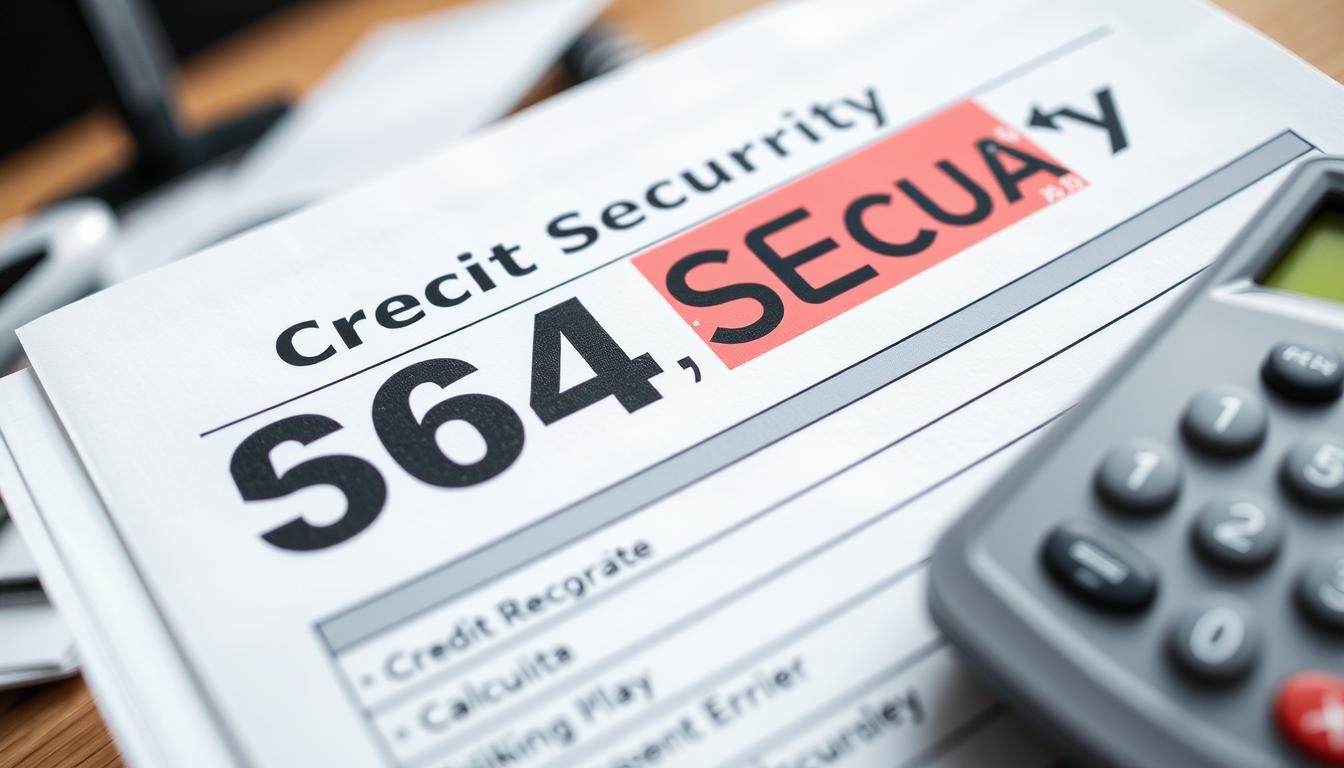An accurate credit report is vital for your financial health. But what if your Social Security number (SSN) is wrong? Let’s explore how to spot and fix SSN errors on your credit report.
These mistakes can harm your creditworthiness and signal potential identity theft. We’ll show you how to protect your identity and maintain correct financial records.
Key Takeaways
- Incorrect SSNs on credit reports can be a sign of identity theft and can negatively impact your creditworthiness.
- Identifying and addressing SSN errors is crucial to maintaining the accuracy of your financial records.
- The credit bureaus have a specific process for disputing and resolving SSN errors, which involves providing supporting documentation.
- Safeguarding your personal information and regularly monitoring your credit report are essential steps to prevent future mistakes.
- Seeking legal recourse may be necessary if credit bureaus fail to resolve SSN errors in a timely manner.
Introduction to Credit Report Errors
An accurate credit report is vital for your financial health. Credit report errors happen more often than you’d expect. These mistakes can hurt your creditworthiness and limit your financial options.
Importance of Accurate Credit Reports
Your credit report shows your financial history to lenders, landlords, and employers. Wrong info can lead to higher interest rates or loan denials. It may even make finding housing or jobs harder.
Keeping your credit report accurate is key to good financial standing.
Common Credit Report Mistakes
Credit report errors can take various forms, including:
- Incorrect personal information, such as name, address, or date of birth
- Inaccurate account details, including balances, payment history, or credit limits
- Erroneous public records, such as bankruptcy filings or tax liens
- Accounts that belong to someone else, known as credit report errors
- Duplicate accounts or accounts that have been closed but still appear on the report
These credit report errors can seriously impact your credit score and finances. Fixing these mistakes is crucial for a healthy credit profile.
| Type of Credit Report Error | Potential Impact |
|---|---|
| Incorrect personal information | Difficulty obtaining credit, employment, or housing |
| Inaccurate account details | Higher interest rates, loan denials, or poor credit score |
| Erroneous public records | Damaged credit history and credit score |
| Accounts belonging to someone else | Identity theft and further credit damage |
| Duplicate or closed accounts | Inflated credit utilization and lower credit score |
Know the types of credit report errors and their effects. This helps you watch your credit report closely. You can then tackle any data accuracy complaints or credit report rectification issues.
Identifying an Incorrect Social Security Number
An incorrect social security number on your credit report is a serious issue. It could indicate identity theft or financial problems. Quick action is vital to safeguard your credit and finances.
A key sign of an ssn wrong on credit report is mismatched personal information. This might include wrong name, birth date, or address details. Unfamiliar accounts or inquiries could also point to fraudulent use of your incorrect social security number.
| Red Flags of an Incorrect Social Security Number | Potential Consequences |
|---|---|
|
|
If you spot an incorrect social security number on your credit report, act fast. Understand the possible outcomes and start disputing the error with credit bureaus right away.

ssn wrong on credit report
Finding an incorrect Social Security number on your credit report can be alarming. It may signal potential identity theft. Knowing the signs of identity theft is vital for protecting your finances.
Recognizing the Indicators of Identity Theft
When your SSN is wrong on your credit report, watch for these identity theft signs:
- Unfamiliar accounts or credit inquiries on your report that you didn’t initiate
- Sudden, unexplained changes in your credit score, either a significant drop or an unexpected increase
- Suspicious activity, such as unauthorized charges or balances on accounts you don’t recognize
- Receiving collection notices or bills for accounts that don’t belong to you
- Encountering difficulties when applying for credit, loans, or even a job due to credit report discrepancies
These red flags should prompt immediate action to investigate and protect your identity. Ignoring identity theft signs can lead to financial losses and damaged credit.
Recognizing early warning signs allows you to address the problem quickly. You can take steps to regain control of your financial identity. Next, we’ll explore how to dispute errors with credit bureaus.
Disputing Errors with Credit Bureaus
Found an error on your credit report? Act fast to fix it. The credit bureaus dispute process helps correct mistakes and keep your info accurate.
Gathering Supporting Documentation
To dispute with credit bureaus, gather proof to back your claim. This evidence will show the error in your credit report.
Get copies of your credit reports from Experian, Equifax, and TransUnion. Find the mistake, like a wrong Social Security number, and highlight it.
Collect documents that prove the correct info. Use your Social Security card, driver’s license, or other official ID. Write a detailed letter explaining the error with your evidence.
- Obtaining copies of your credit reports from each of the three major credit bureaus: Experian, Equifax, and TransUnion.
- Identifying the specific error, such as the incorrect Social Security number, and highlighting it on the report.
- Collecting any documentation that can corroborate the correct information, such as your Social Security card, driver’s license, or other official identification.
- Preparing a detailed letter or dispute form explaining the error and providing the supporting evidence.
With this info, you can start the credit report rectification process. This increases your chances of success with the credit bureaus dispute process.
| Credit Bureau | Contact Information | Dispute Process |
|---|---|---|
| Experian | P.O. Box 4500, Allen, TX 75013 | Online, by mail, or by phone |
| Equifax | P.O. Box 740256, Atlanta, GA 30374 | Online, by mail, or by phone |
| TransUnion | P.O. Box 2000, Chester, PA 19016 | Online, by mail, or by phone |
Follow these steps in the credit bureaus dispute process. You can address data accuracy complaints and succeed in fixing credit report mistakes.
Steps to Correct Social Security Number Errors
Found an incorrect Social Security number (SSN) on your credit report? Act fast to fix it. Here are key steps to correct ssn wrong on credit report and ensure accurate credit info:
- Contact the credit bureaus: Inform Experian, Equifax, and TransUnion about the credit report errors. Give them your correct SSN and supporting docs.
- Verify your SSN with the Social Security Administration (SSA): Get official SSN proof from the SSA. Submit this to credit bureaus.
- Submit a dispute: File with each bureau. Provide proof for credit report rectification of your SSN. Follow their dispute process carefully.
- Monitor the resolution: Track your dispute progress. Follow up if not resolved on time. Be persistent until your credit reports show accurate info.
Taking these steps helps fix ssn wrong on credit report issues. It keeps your credit info accurate and current.
Maintaining correct credit reports is vital for financial health. Act quickly if you spot any errors.
Credit Bureaus’ Dispute Resolution Process
Fixing credit report errors is vital for an accurate financial history. The dispute resolution process investigates and corrects inaccuracies on your credit report. This ensures your credit profile truly reflects your financial standing.
Timeline for Resolution
Credit bureaus must investigate disputes within a set timeframe. The Fair Credit Reporting Act (FCRA) requires them to complete investigations in 30-45 days. This timeline depends on the case’s complexity.
During this period, bureaus will update you on your dispute’s status. They’ll also contact the data furnisher to verify the disputed information’s accuracy. Data furnishers are entities that provided the information in question.
If information is inaccurate, bureaus will promptly correct your report. For verified information, they’ll explain their decision in writing. You’ll then have the right to add a dispute statement to your file.
“The credit bureaus’ dispute resolution process is a critical step in fixing credit report mistakes and ensuring the credit report rectification you deserve.”
Persistence is key when dealing with the credit bureaus dispute process. Stay informed and gather relevant documentation. Follow up regularly to ensure a timely resolution to your credit report issues.

Safeguarding Your Personal Information
Protecting your personal info is vital in the digital age. It prevents identity theft and keeps your credit report accurate. Guarding your Social Security number (SSN) is a key step.
Treat your SSN with care. Never carry your Social Security card. Be careful about sharing your number with others.
Check your credit report often. Look for any strange or unauthorized activity. This helps spot potential identity theft or errors quickly.
Watch for red flags. These include unfamiliar accounts, unexplained changes to your info, or inquiries from unknown sources.
| Identity Theft Red Flags | Credit Report Errors |
|---|---|
|
|
Stay alert and watch your credit report closely. This guards your personal info and helps tackle issues fast. These steps protect your finances and prevent identity theft or credit report errors.
Monitoring Your Credit Report
Keeping tabs on your credit report is vital in our digital world. Regular reviews help spot and fix credit report errors. This protects your financial health. Many free credit report services make this task easier.
Free Credit Report Services
Experian, Equifax, and TransUnion offer free yearly credit reports. These reports show your credit history, accounts, and payment records. They also list any data accuracy complaints.
AnnualCreditReport.com lets you access free reports from all three bureaus annually. Credit Karma provides free Equifax and TransUnion reports and scores. Credit Sesame offers free Experian reports, scores, and monitoring tools.
Using these free resources helps you stay on top of your credit info. You can spot issues early and fix them quickly. This keeps your credit profile healthy and error-free.

Legal Recourse for Unresolved Errors
The Fair Credit Reporting Act (FCRA) protects your right to dispute credit report errors. It ensures credit bureaus investigate and fix inaccuracies promptly. You can take action if your Social Security number remains incorrect on your credit report.
Filing a complaint with the Consumer Financial Protection Bureau (CFPB) is a good first step. The CFPB investigates consumer financial issues, including data accuracy complaints. They can help resolve disputes between you and credit bureaus.
If credit bureaus don’t address the issue, consider seeking legal help. An FCRA attorney can guide you through the process. They can protect your rights and seek damages if bureaus fail to correct errors.
You deserve an accurate credit report that reflects your true financial identity. Don’t hesitate to take legal action if needed. Protecting your financial well-being is crucial.
| Legal Recourse | Description |
|---|---|
| File a Complaint with the CFPB | The Consumer Financial Protection Bureau investigates consumer financial issues, including data accuracy complaints related to credit report rectification. |
| Seek Legal Assistance | Hire an attorney who specializes in FCRA violations to help navigate the process and ensure your rights are protected, including seeking damages if the credit bureaus have failed to correct the error. |
Preventing Future Credit Report Mistakes
Keeping your credit report accurate is an ongoing task. Credit monitoring services can help you stay vigilant. These tools allow you to safeguard your personal information effectively.
Credit Monitoring Services
Credit monitoring services offer comprehensive oversight of your credit reports and scores. They cover the three major credit bureaus: Experian, Equifax, and TransUnion. These services help detect credit report errors and potential identity theft quickly.
- Receive alerts of changes to your credit reports, such as new accounts, inquiries, or derogatory information
- Monitor your credit scores and track changes over time
- Receive notifications of suspicious activity that could indicate identity theft
- Obtain regular copies of your credit reports and review them for accuracy
- Access educational resources and guidance on managing your credit and protecting your identity
Regular credit monitoring helps maintain your financial records’ integrity. It allows you to act quickly on any issues that arise. This proactive approach can save you time and money in the long run.
By staying on top of your credit, you can avoid future disputes over credit report errors. It’s a smart way to safeguard your personal information and financial health.

“Regularly monitoring your credit reports and credit scores is one of the best ways to protect yourself from identity theft and ensure the accuracy of your financial records.”
Conclusion
An incorrect Social Security number (SSN) on your credit report can lead to serious problems. It may result in identity theft and other financial issues. Addressing this error quickly is crucial for your financial health.
Look for signs of SSN errors, like mismatched personal info or unfamiliar accounts. If you spot these issues, dispute them with credit bureaus right away. This helps protect your financial well-being.
Gather supporting documents and follow the credit bureaus’ dispute process. Monitor your credit report regularly to keep your financial history accurate. Use credit monitoring services to prevent future errors.
Stay vigilant about protecting your personal information. This will help maintain the integrity of your credit report and SSN. Regular checks can catch and fix problems early.

